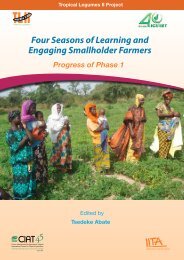Sorghum - icrisat
Sorghum - icrisat
Sorghum - icrisat
Create successful ePaper yourself
Turn your PDF publications into a flip-book with our unique Google optimized e-Paper software.
with peers, and 55% were involved in training<br />
other staff. About 80% of the participants are still<br />
applying the skills and knowledge gained at<br />
ICRISAT, indicating relevance, usefulness and<br />
sustainability of learning. Nearly, 73% participants<br />
expressed that their job performance was<br />
enhanced by more than double through their<br />
exposure to ICRISAT.<br />
These training courses also helped ICRISAT to<br />
generate additional funds. For example, in 2004,<br />
sorghum group at ICRISAT-Patancheru earned<br />
about US$10,000 by offering course on hybrid<br />
parents development.<br />
Other means of capacity building are farmers’ and<br />
scientists’ field days. ICRISAT conducts sorghum<br />
scientists’ (both ICRISAT and NARS) field days in<br />
Africa and Asia (Figures 32 and 33). It also conducts<br />
almost every year farmers’ field days in<br />
collaboration with NARS in each region (Figures<br />
34 and 35). These field days also help to get<br />
feedback from the participants on research/<br />
products and thus help to shape up ICRISAT’s<br />
research portfolio.<br />
Figure 32. Director General –ICRISAT along with<br />
other scientists listens to principal sorghum breeder<br />
during ICRISAT Scientists field day.<br />
Figure 34. Farmers sharing the knowledge gleaned from<br />
more than 30 years of ICRISAT’s sorghum research in<br />
sorghum field day conducted by ICRISAT in Africa.<br />
Figure 33. NARS sorghum scientists participated in sorghum scientists field day at ICRISAT, Patancheru.<br />
29
















